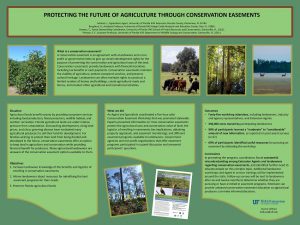Sullivan, J.1, Boughton, R.2, Demers, C.3, Pienaar, E. F.4
1 Agriculture Agent, University of Florida IFAS Extension-Osceola County, Kissimmee, FL 34744
2 Assistant Professor, University of Florida IFAS Range Cattle Research and Education Center, Ona, FL, 33865
3 Forest Stewardship Coordinator, University of Florida IFAS School of Forest Resources and Conservation, Gainesville, FL, 32611
4 Assistant Professor, University of Florida IFAS Department of Wildlife Ecology and Conservation, Gainesville, FL, 32611
Situation: Florida agricultural lands are under intense pressure from urbanization. These lands benefit society by providing ecosystem services including food production, flood protection, outdoor recreation, and wildlife habitat. Conservation easements provide landowners with financial incentives to remove the development rights from their agricultural working lands, thereby maintaining the viability of Florida agriculture, protecting ecosystem services and preserving cultural heritage. Extension Faculty designed a pilot program on conservation easements with the following objectives: 1) increase landowner knowledge of the benefits and logistics of enrolling in conservation easements; 2) inform landowners about resources for identifying the best easement programs for their needs; 3) preserve Florida agricultural lands. Methods: An Agent and Specialists coordinated a five-hour Conservation Easement Workshop that was promoted statewide. Experts presented information on: how conservation easements protect the agricultural uses and conservation value of land; the logistics of enrolling in easements (tax implications, obtaining property appraisals, and easement monitoring); and different easement programs available to landowners. Entities that offer easement programs participated in a panel discussion and answered participants’ questions. Results: Forty-five landowners, industry and agency representatives, and Extension Agents attended the pilot workshop. Participating landowners own 350,000 acres of land. Post-event surveys (n=32) indicated that 90% of participants learned a “moderate” to “considerable” amount of new information, and 69% identified useful resources for pursuing an easement by attending the workshop. Conclusion: In promoting the workshop, coordinators found substantial misunderstanding among Extension Agents and landowners regarding conservation easements, and identified further training needs. Additional workshops and in-service trainings will be implemented around the state. Follow-up surveys will be sent to landowners after six and twelve months to determine whether they plan to, have applied for, or enrolled in easement programs. Conservation easement education offered by Extension provides unbiased information about conservation easements that landowners need to make informed decisions.
 0
0

